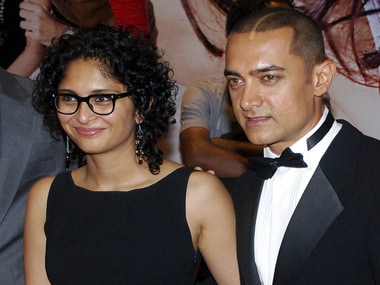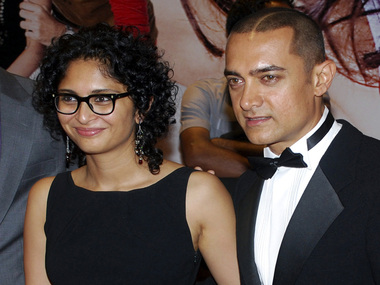Back during the Winter Session of Parliament, when the intolerance debate got a second wind, Firstpost put together the top talking points in the GST bill, which is poised to become a hot button once again in the Budget session. Here goes: – Aamir Khan has given the Oppostion another new, improved stick to beat the government with as the winter session of Parliament begins Thursday 26 November : Intolerance. Just when Finance Minister Arun Jaitley is investing every ounce of his mental energy on pushing the government’s ambitious indirect tax reform through the Rajya Sabha where the BJP numbers are too low to muscle it in alone, Bollywood has stormed in. The Congress-led Opposition is likely to push for a resolution to condemn the “rise in intolerance”, the government is unlikely to concede ground there and will be well prepared to paint the Dadri lynching, it’s partner Shiv Sena’s ink bottle politics as localized law and order issues at the state level. [caption id=“attachment_2521558” align=“alignleft” width=“380”]  Aamir Khan and wife Kiran Rao/ Reuters[/caption] The government will hope to bring the focus back to its pet agenda GST; the Opposition has its knives out. “Prime Minister Narendra Modi said that the GST legislation is in the interest of nation and the Finance Minister will speak to parties concerned to address their doubts on it,” Parliamentary Affairs Minister Venkaiah Naidu said. The Congress would not like to to be seen as blocking a reformist bill such as the GST, but it does not want to climb down too steeply either. It wanted eight changes earlier. The Indian Express reports that the “non-negotiables” could now be down to three — it wants an 18 per cent cap on tax to be levied, scrapping of the proposal to levy an additional one per cent tax and wants formation of a GST disputes settlement authority specified in the bill. Amid indications of a tough session ahead, senior Ministers on Tuesday huddled to chalk out the strategy and work out floor coordination plans while parties like the Congress, JDU and CPI(M) made their intentions clear, deciding to give notices for debate on the issue of intolerance and attacking the government on the key reform measure of GST. Arun Jaitley has reached out to the Congress-led Opposition in a final burst of lobbying to get a veto proof majority for the Goods and Services Tax ( GST) Bill which is likely to headline the winter session of Parliament that begins 26 November. Jaitley’s effort to stitch up a swift and likely tacky consensus if at all has regained steam after BJPs huge loss in the Bihar elections. The GST Bill, which will ‘absorb’ all indirect taxes and integrate the country into a single market, has been approved by the Lok Sabha and is pending approval in the Rajya Sabha. The political alphabet soup looks like this: JD(U) has 12 members in the Rajya Sabha, the ruling NDA is well short of majority, RJD has only one MP, states like Tamil Nadu which have large numbers of MPs in the Rajya Sabha, have already said that the bill “compromises state autonomy”. “The wisdom which dawned on my friends in the Congress party had not dawned on them when Pranab Mukherjee (when he was Finance Minister) introduced the GST. It did not dawn on them when Mr P Chidambaram accepted the standing committee recommendations. But to come out with the preposterous suggestion that tariff must be mentioned in the Constitution document so that in a given exigency, if tariff has to be altered, you need a two-third majority in both houses of Parliament and has to go to each of the states,” is Jaitley’s response. The April 1 deadline for a nationwide rollout of the GST — the most ambitious tax reform in the last six decades — needs a two thirds majority in the Rajya Sabha to become law. The BJP has just 48 members in a house of 242 sitting members as on date. Yet, Narendra Modi, speaking in Singapore, said “we are hopeful to roll out the GST regime in 2016.” [caption id=“attachment_2516238” align=“alignleft” width=“380”]  Finance Minister Arun Jaitley. Reuters[/caption] It is now relatively clear now that the Janata Dal ( United), fresh from its Bihar victory is likely to gang up alongside the Opposition unity against the GST bill ( which JDU earlier supported). “There are new circumstances. We will take a decision in consultation with other opposition parties,” a JD(U) MP said. Congress, a part of the Grand Alliance which has taken power in Bihar, has opposed certain provisions of the reform bill and blocked its passage in the Monsoon Session of Parliament. The Government has a long shopping list of bills to pass in the winter session. The GST bill and the Real Estate Bills are likely to dominate the session’s early rounds of political jabbing. “It would be unfair to the country to impose in the name of compromise, a defective GST. I will expect the party which ruled India for nearly half a century to reconsider some of the suggestions,” Jaitley said reacting to the many inputs for tweaking the provisions of the GST bill. BJPs Rajya Sabha numbers The Rajya Sabha currently has 242 sitting members. The BJP desperately needed to win Bihar to improve its Rajya Sabha numbers, which stands at 48. The BJP, along with its allies, is terribly short of a majority in the Upper House and many of the Government’s high priority bills are stuck because of this lack of muscle. The Times of India explains why the Bihar loss is a double whammy for the BJP in the Rajya Sabha. What is the GST Bill? The Goods and Service Tax Bill or GST Bill proposes a national Value added Tax to be implemented in India from April 2016. It intends to be a comprehensive indirect tax on manufacture, sale and consumption of goods and services throughout India, to replace taxes levied by the Central and State governments. GST would be levied and collected at each stage of sale or purchase of goods or services based on the input tax credit method. This method allows GST-registered businesses to claim tax credit to the value of GST they paid on purchase of goods or services as part of their normal commercial activity. Taxable goods and services are not distinguished from one another and are taxed at a single rate in a supply chain till the goods or services reach the consumer. Administrative responsibility would generally rest with a single authority to levy tax on goods and services. Exports would be zero-rated and imports would be levied the same taxes as domestic goods and services adhering to the destination principle. The Hindu has a quick fix on ten highlights of the GST bill introduced in 2014 by Jaitley. With opposition parties buoyant after NDA’s drubbing in Bihar, senior JD(U) leaders have said they will take a final call only after consulting other parties Subramanian panel report The Arvind Subramanian-led panel on recommending revenue-neutral rates for the proposed Goods and Service Tax (GST) would submit its report in the first week of December, senior policymakers said on Monday. Tamil Nadu, which has 18 RS members, has opposed GST saying it compromises the autonomy of States in fiscal matters. “The decision-making rule and voting weightage gives Government of India an effective veto in GST Council and no distinction is made amongst the States in the weightage,” is Tamil Nadu’s official line. Another key demand from Tamil Nadu is that petroleum and petroleum products be totally kept outside the GST purview. TN wants 100 per cent compensation to states for a 5 year period. Just yesterday, in what is overtly an unrelated transaction, the Central government released Rs 900 crore to Tamil Nadu for flood relief. Top state government officials say this won’t help buy any extra peace on GST because more than Rs 500 crore of this 900 crore has been pending after complaints that the 14th Finance Commission was not “fair” to TN. The rest of the money has been due since last year, officials said.
Aamir Khan has given the Oppostion another new, improved stick to beat the government with as the winter session of Parliament begins Thursday 26 November : Intolerance.
Advertisement
End of Article


)

)
)
)
)
)
)
)
)



